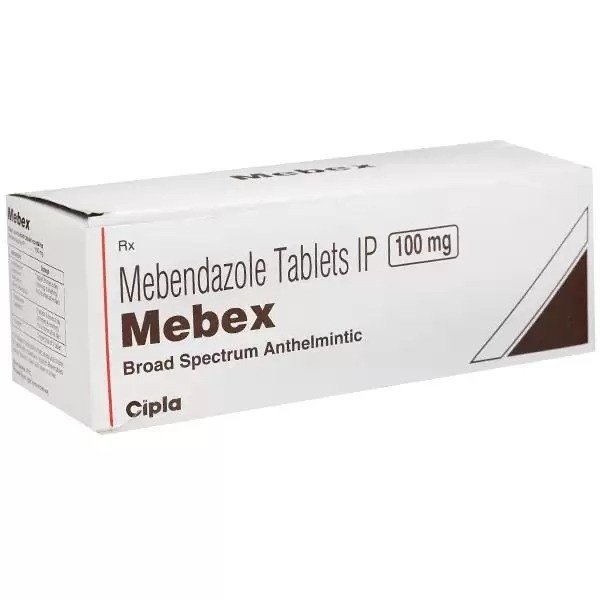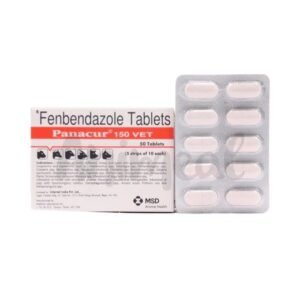Mebex 100 mg Mebendazole is an antiparasitic medication for the cure of many worm infestation in animals and man. It is a drug that is designed to cure many parasitic infections from hookworms, whipworms, Pinworms, Cestodes (tapeworms), and round worm. This antiparasitic drug is a benzimidazole class of drugs.
Key Features
| About Mebex 100 mg (Mebendazole) | |
|---|---|
| Drug Class | Anthelmintic |
| Subclass | Benzimidazoles |
| Product Details (Mebex 100 mg) | |
|---|---|
| Composition | Active Ingredient: Mebendazole Inactive Ingredients: • Anhydrous Lactose • Corn Starch • Magnesium Stearate • Microcrystalline Cellulose • Saccharin Sodium • Sodium Starch Glycolate • Stearic Acid |
| Packaging Type | Blister Pack |
| Pack Size | 1 × 10 tablets |
| Dosage Strength | 100 mg |
| Manufacturer | Shreeji Pharma |
| Shelf Life | 3 years from the date of manufacturing |
| Indications / Usages | Treatment of various parasitic worm infections |
| Country of Origin | India |
How does Mebex 100 mg Mebendazole works?
Mebex 100 mg Mebendazole is an antiparasitic medication that functions by:
- Preventing microtubule formation: Mebendazole blocks tubulin, a protein required for the formation of microtubules, which is disruptive to cellular activities in parasites.
- Disrupting glucose transport: It blocks the uptake of glucose, starving parasites of nutrients and energy.
- Damaging parasite cells: Mebendazole causes cellular injury, ultimately leading to parasite death.
Dosage
Mebex 100 mg Mebendazole dosage can vary depending on the condition being targeted, patient factors, and medication form. The following are some guidelines on general dosing:
- Pinworm infection (adult and children over 2 years): 100 mg per day, repeat in 2-3 weeks if not cured.
- Roundworm infection (adult and children over 2 years): 100 mg twice daily for 3 consecutive days or 500 mg as a single dose.
- Whipworm infection (adult and children over 2 years): 500 mg as a single dose.
- Hookworm infection (adult and children over 2 years): 100 mg twice daily for 3 consecutive days.
Factors Influencing Dosage
Type of parasitic infection: Various parasites are needed in various dosages
- Patient weight: Dosage can be weight-dependent, particularly in veterinary medicine
- Form: Various forms (e.g., tablet, suspension) can have varying dosage instructions
Uses
Mebex 100 mg Mebendazole is indicated for treatment of parasitic infections of the following types:
- It is indicated for treatment of infections due to hookworms, Ancylostoma duodenale and Necator americanus.
- It is indicated for treatment of infections due to roundworms, Ascaris lumbricoides.
- It is used to treat whipworm infections, Trichuris trichiura infections.
- It is used to treat Pinworm infections, Enterobius vermicularis infections.
Side Effects
- Nausea
- Vomiting Diarrhea
- Abdominal pain
- Headache
- Dizziness
Interactions
- Anticoagulants: Risk of increased bleeding.
- CYP3A4 inhibitors or inducers: Can affect the metabolism and effectiveness of fenbendazole.
- Other medications: Interaction with other drugs, e.g., anticonvulsants or immunosuppressants
Pharmacokinetics
- Poor oral bioavailability: Poor water solubility and permeability limit its absorption and availability within the body systemically, and it becomes challenging to achieve therapeutic levels in tumors.
- Metabolism: Fenbendazole is metabolized through cytochrome P450 enzymes CYP2C19 and CYP3A4, which affect its plasma levels.
- Distribution: Tissue distribution of Fenbendazole is asymmetric with potential limitations in achieving effective levels in a particular location for tumors.
Clinical Trial
- NCT01729260 (Phase 1): Mebendazole plus temozolomide for high-grade gliomas. The results indicated that oral mebendazole can be safely administered at high doses with temozolomide.
- NCT01837862 (Phase 1/2): Mebendazole in pediatric gliomas. The study assessed the safety and efficacy of mebendazole combined with vincristine, carboplatin, and temozolomide.
- NCT03628079 (Phase 1/2): Mebendazole monotherapy for the treatment of advanced gastrointestinal cancer. Though completed, it sought to determine the safety and efficacy of mebendazole.
Precautions
- Safety issues: Long-term safety in man is unknown, and possible toxicity and interactions with other treatment regimens must be studied with great care.
- Liver function: Those patients with impaired liver function must exercise care while using fenbendazole since elevation of liver enzymes has been noted in some instances.
- Dosage and treatment regimen: Ideal dosage and treatment regimens are unknown, and clinical trials must be undertaken to define these parameters.
- Patient-specific factors: Patient response and cancer types may differ, with further research needed to identify cancers that could be helped by fenbendazole treatment.
Conclusion
Mebex 100 mg Mebendazole is an effective antiparasitic medication to cure worm infestations like hookworms, roundworms, whipworms, and pinworms. It works by disrupting the cellular structure and function of parasites, ultimately leading to their death. Although generally well tolerated, it is important to follow the prescribed dose and warnings to prevent side effects and successful treatment.
FAQs
1. What is Mebendazole used for?
Mebendazole is an antiparasitic medication for the cure of many worm infestation in animals and man.
2. How does Mebendazole work?
Mebendazole blocks tubulin, a protein required for the formation of microtubules, which is disruptive to cellular activities in parasites ultimately leading to death of a parasite.
3. What are the common side effects of Mebendazole?
The common side effects of Mebendazole are Nausea, Vomiting, Diarrhea, Abdominal pain, Headache, and Dizziness.
4. Can Mebendazole be taken during pregnancy?
No, Mebendazole is not recommended to use during pregnancy, but prior need to consult your doctor.
5. Is Mebex 100 mg Mebendazole safe for everyone?
Yes, it is generally safe but children below 2 years should avoid and it is recommended to use after consulting your doctor or medical professional.
References
| Mebendazole Tablets | 30 Tablets $50, 50 Tablets $80, 100 Tablets $140, 300 Tablets $290 |
|---|
1 review for Mebex 100 MG Mebendazole Tablet
It is highly recommended to consult a healthcare provider or doctor before using any of the above medications. This content is for educational purposes only. We advise you to read all the information mentioned by the manufacturer on the medicine before using it.








Mont blank –
Quickly helped tackle intestinal worms with just a short course; well tolerated and simple to use.